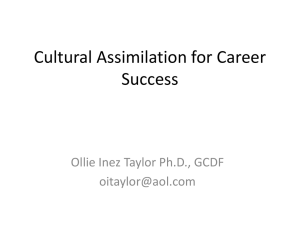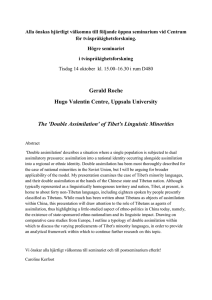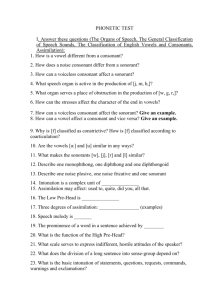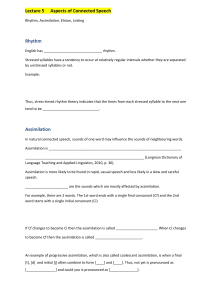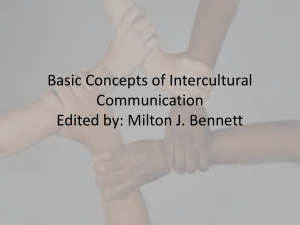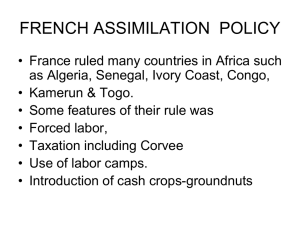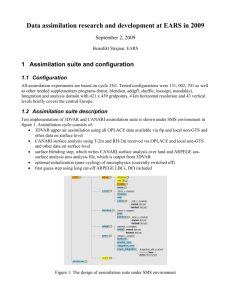Lutz / Snyder The Root of the English Language – Greek and Latin
advertisement
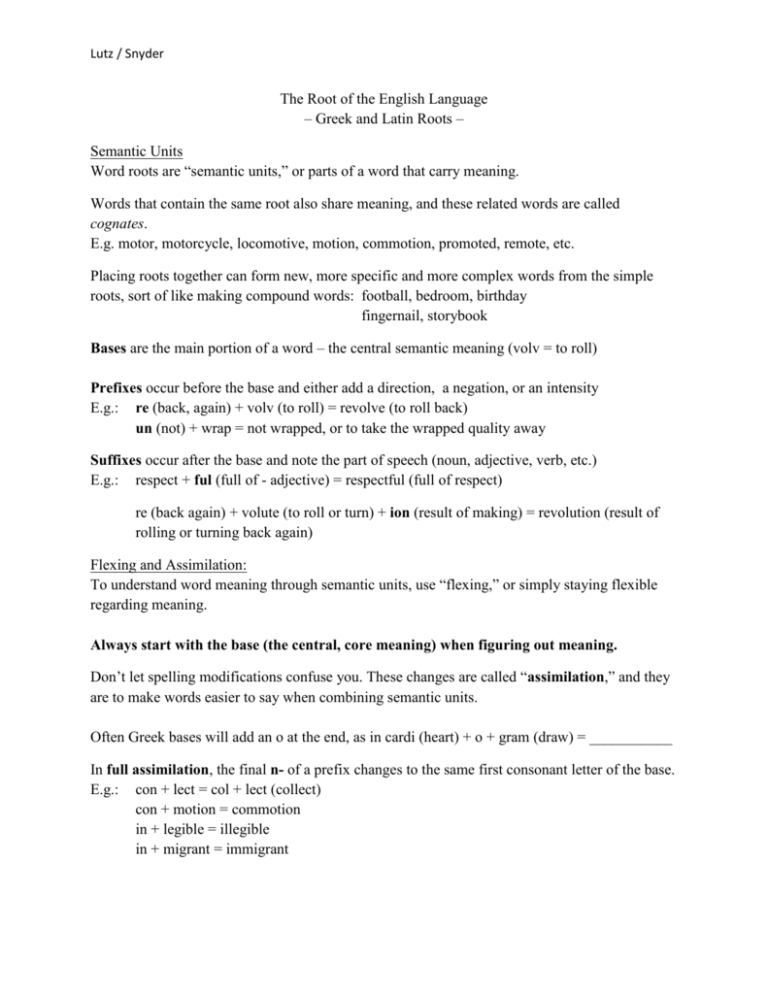
Lutz / Snyder The Root of the English Language – Greek and Latin Roots – Semantic Units Word roots are “semantic units,” or parts of a word that carry meaning. Words that contain the same root also share meaning, and these related words are called cognates. E.g. motor, motorcycle, locomotive, motion, commotion, promoted, remote, etc. Placing roots together can form new, more specific and more complex words from the simple roots, sort of like making compound words: football, bedroom, birthday fingernail, storybook Bases are the main portion of a word – the central semantic meaning (volv = to roll) Prefixes occur before the base and either add a direction, a negation, or an intensity E.g.: re (back, again) + volv (to roll) = revolve (to roll back) un (not) + wrap = not wrapped, or to take the wrapped quality away Suffixes occur after the base and note the part of speech (noun, adjective, verb, etc.) E.g.: respect + ful (full of - adjective) = respectful (full of respect) re (back again) + volute (to roll or turn) + ion (result of making) = revolution (result of rolling or turning back again) Flexing and Assimilation: To understand word meaning through semantic units, use “flexing,” or simply staying flexible regarding meaning. Always start with the base (the central, core meaning) when figuring out meaning. Don’t let spelling modifications confuse you. These changes are called “assimilation,” and they are to make words easier to say when combining semantic units. Often Greek bases will add an o at the end, as in cardi (heart) + o + gram (draw) = ___________ In full assimilation, the final n- of a prefix changes to the same first consonant letter of the base. E.g.: con + lect = col + lect (collect) con + motion = commotion in + legible = illegible in + migrant = immigrant Lutz / Snyder In partial assimilation, the n- changes to an –m if the base begins with –b or –p. E.g.: con + bine = combine in + possible = impossible Other full assimilation prefixes are as follow: ad- (drops the d and changes to the first consonant letter of the base) ad + celebrate = accelerate ad + gravate = aggravate ad + pendix = appendix ad + tract = attract Note: a-, ab-, and abs- NEVER assimilate. Only ad- does. dis- / di- assimilate to dif- when the base begins with an f. E.g.: dis + fuse = diffuse di + ferent = different ob- changes to the first consonant of the base when doing so would make it easier to pronounce. E.g.: ob + struction = obstruction (no change) ob + pression = oppression (slightly easier to say) sub- assimilates by dropping the b and adding the first consonant of the base E.g.: sub + pose = suppose sub + cess = success Understanding Assimilation convention conference concur inaudible invisible infinite [These are easy enough to pronounce, so no assimilation is necessary!] Partial assimilation: inpossible = __________________ inportant = __________________ conbine = __________________ conplicate = __________________ conpose = __________________ inlegal = __________________ Lutz / Snyder Full assimilation: inlegal = inresponsible = conloquial = conrect = _____________________ _____________________ _____________________ _____________________ Flexing with multiple prefixes Almost always, these will be “negative” or “repetition” of a word that you recognize already. E.g.: “reconstruction” First, identify and remove the first prefix – reNext, try to identify the remaining word – construction Finally, add back in the meaning of the first prefix Flexing figuratively Sometimes words contain meaning derived from a different level, something less restricted by the literal meanings of the roots combined. E.g.: vid- / vis- means “to see” super (over) + visor = over + see-er / someone who oversees another’s work pro (forward / ahead) + vide = seeing ahead / looking forward and getting what we need We do this more often than we might think. Sort the list below into literal seeing or figurative seeing. Literal seeing Figurative seeing Do you see my point? Do you see the rainbow? See to it that the chores are completed. See the pretty picture. Now I see what you mean. Now I see a storm cloud. How about this: volute = to roll / to turn Revolution in science class might mean how a planet “rolls or turns” around the sun. But in history class, revolution might mean events that upset things and cause a political roll or turning around. And in English class, we might read a selection from a volume, a word which makes reference to ancient printing on rolls of papyrus. Lutz / Snyder Or this: cur(r) / curs / cour(s) mean “to run” cursive script: _________________________________ computer cursor:_______________________________ a river current: _________________________________ current events:_________________________________ cash currency: _________________________________ incurring debt:_________________________________ going on an excursion:___________________________ concur: (think “run together with”)_________________ military incursion of another country:_______________
